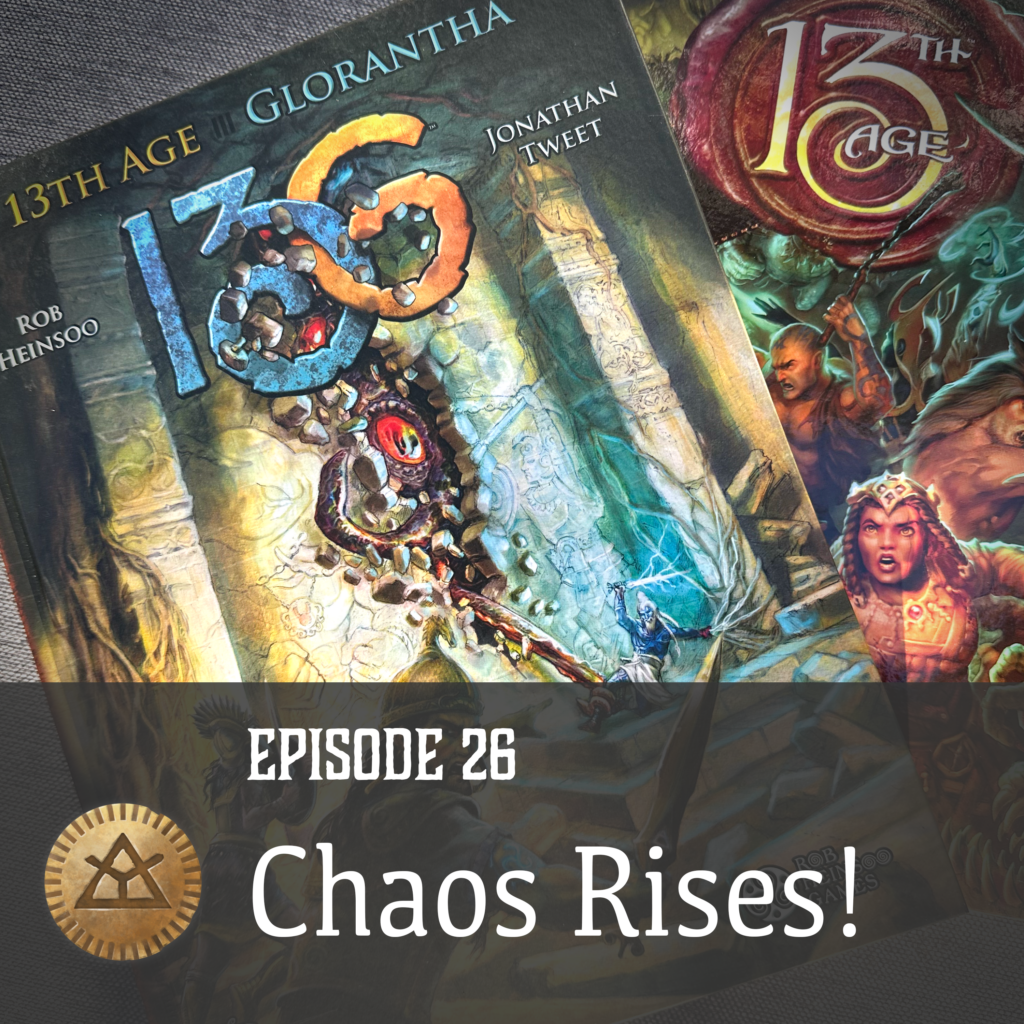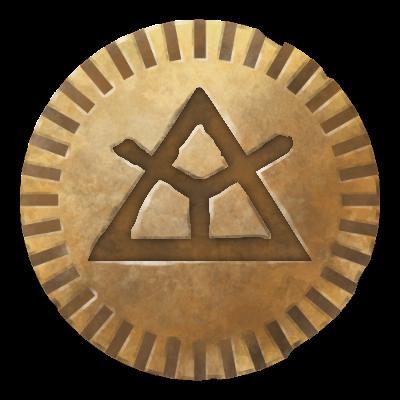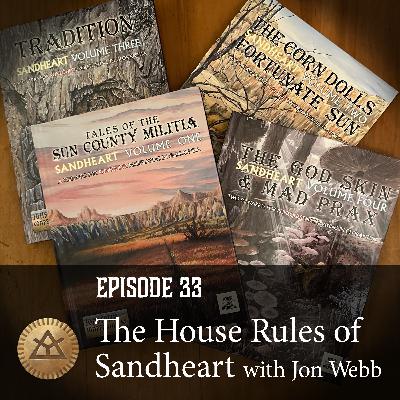Episode 26: Chaos Rises!
Description
 </figure>
</figure>In this episode which we finally get around to talking about 13th Age Glorantha. Ludo and Jörg are joined by Becca of “Dames & Dice” fame on the Iconic Podcast, and by Evan Franke, of “Exploring Glorantha” fame.
- Becca is part of the Iconic Production Podcast, a bunch of podcasts and channels dedicated to talking about 13th Age, which includes 13th Age Glorantha. Becca has Glorantha experience not just from a multi-session game of 13th Age Glorantha, but also from two RuneQuest Roleplaying in Glorantha games (one of which she talks about in episode 5 of Dames & Dice).
- Evan has already been on this podcast together with J-M in episode 19 of our podcast, talking about Jackals and Ancient World-Building. He may be more familiar to you as the source of deep Glorantha lore on the Exploring Glorantha YouTube series. He jokingly describes himself as a “hanger-on” of Iconic Production podcasts and actual plays.
As Ludo expounds on the history of Glorantha as a setting for games, Becca drops that she has the board game: a copy of the original White Bear and Red Moon, gifted to her at Christmas last year by her dad who did a lot of roleplaying in college along a couple of AD&D 1st edition books.
13th Age
Ludo admonishes people to not just buy the 13th Age Glorantha book thinking of it as a full game as you need the 13th Age rules along with this book. (Ludo claims it has to be the full rules book, but it is possible to work out the rules from the SRD which is free from Pelgrane Press)
Becca outlines 13th Age: a fantasy D20 roleplaying game which feels somewhat similar to D&D 5th edition with a few exceptions (no skills, backgrounds, the idea of failing forward) and being a lot more heroic in scope than your usual start into a D20 game.
Ludo quotes descriptions of 13th Age as a mix of D&D 3.5 and D&D 4th edition, usually in reflection of its authors’ involvement in those two iterations of D&D.
Ludo comments on the tone of the writing in the 13th Age rules book, and on the emphasis on the player characters being the heroes (and movers and shakers) in the world rather than just another bunch of schmucks.
Becca agrees that beginning characters are a lot more powerful than in D100 games or like roughly a 5th level character in D&D 5th edition.
Icons
One thing to put your character on the hero’s path is your Iconic Relationship, a connection to one of the 13 Icons in 13th Age. (The number 13 comes up a lot…)
There are 13 Icons to the world, great beings who can influence your character and how that character is made.
Jörg asks what an Icon is: a god, a demigod? Becca gives a few examples, like the Emperor (of the Dragon Empire) who has a lot of resources and followers behind him, the Great Druid who lives in the woods with an agenda to let nature take down civilization, the Diabolist, the Crusader, the Orc Lord, etc.
In Gloranthan terms, these would be people like the Red Emperor (a reincarnating demigod) or Zzabur (immortal sorcerer supreme). Ludo points out that while these Icons may have agendas antagonistic to one’s own personal or cultural agendas, there are no outright good or evil individuals among these Icons.
Rob Heinsoo and Jonathan Tweet went into the rulebook saying “It is your world, nothing has to work in it like it does in our world.” That means that the Emperor might really care about running the Dragon Empire down to the details, or he might just use his position as highest authority in the Empire to acquire some certain personal goal or object of power. Likewise the Orc Lord may seem like a terrible person leaving a trail raiding and pillaging behind him, or he could be a liberator for all the monsters in the Empire suppressed by human (elf, dwarf, …) supremacy. Which sounds a lot like Prince Argrath to Jörg.
Ludo points out the conversational style of the rulebook, with little jokes, designers’ notes (at times contradicting one another),
One Unique Thing
In 13th Age, each character has one distinctive feature that sets them apart from all the rest of the people in the world. It may be something big and major from the onset, or it might start as something simple and small but possibly growing as your character acquires levels and more powers.
Becca tells us about her and Evan’s characters in the Iconic Production playtest actual play game. Becca’s character was the last heir to the Ringsome Dukedom, a formerly lovely place now swallowed by a Hellhole. Evan has something that can either destroy the Lich King (one of the 13 icons) or restore the Lich King to its former glory, the wizard king. Evan describes this as his gift to the GM to shape the campaign, not as an in-game benefit to the character but as a campaign hook for the unfolding story of the characters.
Jörg concludes that this concept might be translated to Glorantha as something like “I am Arkat Reborn” (although Evan points out that that claim is actually not that unique as there will be five Arkats in the foreseeable course of the Hero Wars at the same time).
Ludo asks how that collection of Unique Things for each player character works out in practice for the GM who has to balance these rather different personal spotlights in the course of the campaign, but Becca points out that these reduce the number of Icons the GM has to keep track of for that campaign, with Becca’s heiress having a negative relation to the Diabolist (as source of that Hell Hole), and Evan’s character having (to build) a relation to the Lich King and his activities.
Becca describes Evan’s One Unique Thing as more of an end of campaign (arc) item when the decision which way to go is made while her own theme of dealing with the Hell Hole might be more mid-campaign,
Jörg asks how these rather specific directions of such a campaign align with pre-written adventures for 13th Age. Becca describes how 13th Age adventures too are written in a conversational tone, asking the prospective GM about the main Icons and giving some ideas how each of the Icons might influence this specific adventure, giving 3 or four ideas for each Icon.
Becca quotes some of her own writing for Pelgrane Press for the to be released in a near future, “Behemoths: Path of the Koru”. In her contribution, Becca outlines how the impending death of the Behemoths will affect the Dragon Empire and the future of the setting, providing advice for each Icon how they are involved and what their interest in this event may be.
Ludo points out a narrative mechanism where the players roll on their Icon relations and giving the GM a roll for the Icon which is going to be involved in the next leg of the game, providing another narrative clue to the GM about the direction this play-through of the scenario/campaign is going to take.
Becca gives a practical example how to spend a relationship point to the Icon in a situation where the player characters are stuck, invoking a narrative reason to apply said relationship. And also how a creative GM can take this approach to insert another complication to the lives of the characters.
Ludo rambles about how a gritty D20 game has such narrative mechanics, and Jörg feels reminded of how Fate Points are used in Fate.
Montage Technique
While Ludo is in the spirit of raiding 13th Age for other games, he points out a mechanic that might not even be in the core rules, the Montage technique, allowing you to go through “half the dungeon” in just about 15 minutes.
The GM challenges the players asking one of them to come up with a problem they encounter on their way into the story, and the person next to you will solve it, going through all the players to create a shared idea about the story so fat. Unless it is a big ask, you don’t typically spend spell slots or similarly limited resources on these but just solve these narratively.
Failing Forward
When designing their rules, Jonathan and Rob observed that in many games there was a danger of getting stuck in a station of a scenario if nobody rolled well enough. In order to keep the narrative going, the player attempting e.g. to pick a lock still fails their roll, but the GM still allows the door to open, but introduces a complication. The door opens, and behind it there have gathered a bunch of armed and angry orcs…
Ludo talks about






